Those Responsible – One Week of the Lebanese Revolution
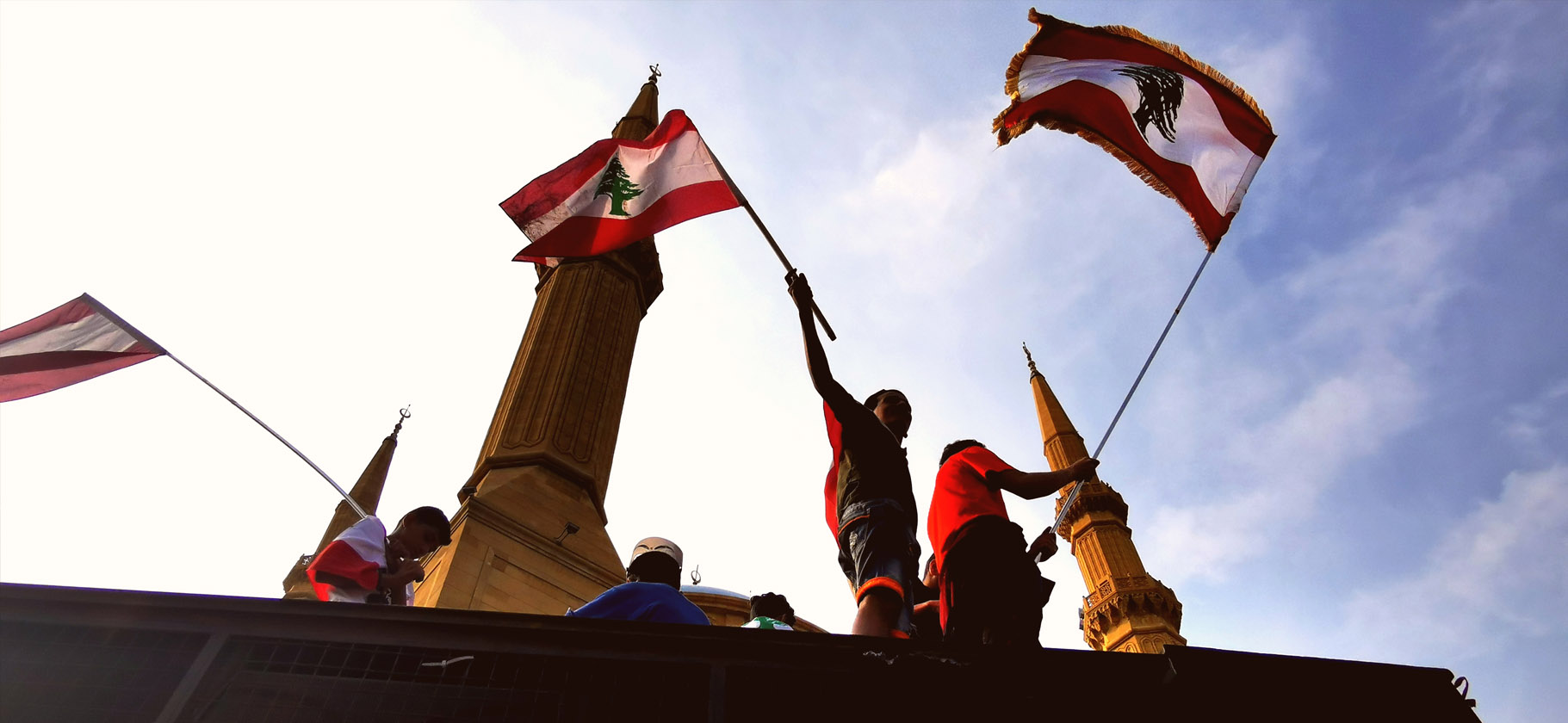
Waves of the Mediterranean Sea crash into the shoreline of a sea of concrete. Monolithic modern high rises tower over the old stone apartments from the period of the French Mandate, which made Beirut the “Paris of the Middle East”; some are now derelict, others await restoration or demolition. The sandy-coloured hue of the buildings makes every bit of green stand out with greater clarity as the sun beats down over the city and pulling up a misty haze that makes the sky and the streets bleed into each other. Streams of cars, vans, and mopeds bob and weave lawlessly along the motorways and city streets with their horns blaring. Any visit to the Middle East forces you to appreciate the delicate chaos that pumps the blood and vitality into the region and makes it so recognizable and unique. It’s challenging, and not for the faint of heart, but there is a peculiar imperfect and exotic beauty that stokes the embers of imagination in visitors. If you can tolerate it, you absolutely love it.
For a moment in the early morning, on the outskirts of the city, the roads are open and the traces of black soot and ash where burning tires have scorched the pavement are the only signs of the current turmoil as the army has, for now, pushed back the people. It began in a flash and with some uncertainty, but the feeling of unrest was widespread and the many factions that often divide Lebanon were united behind the idea that change at the top of their country was necessary. What began with fury turned to a well-organized, peaceful, and determined, demonstration of the people against their government and seeking a wholesale change of the sectarian political system and the downfall of the current regime. First reported as a response to the government’s proposed austerity measures, the focus turned to a consensus that the reason for the uprising was a nationwide sense that the political class in Lebanon had been robbing its people to line their own pockets for too long and that they should all resign.
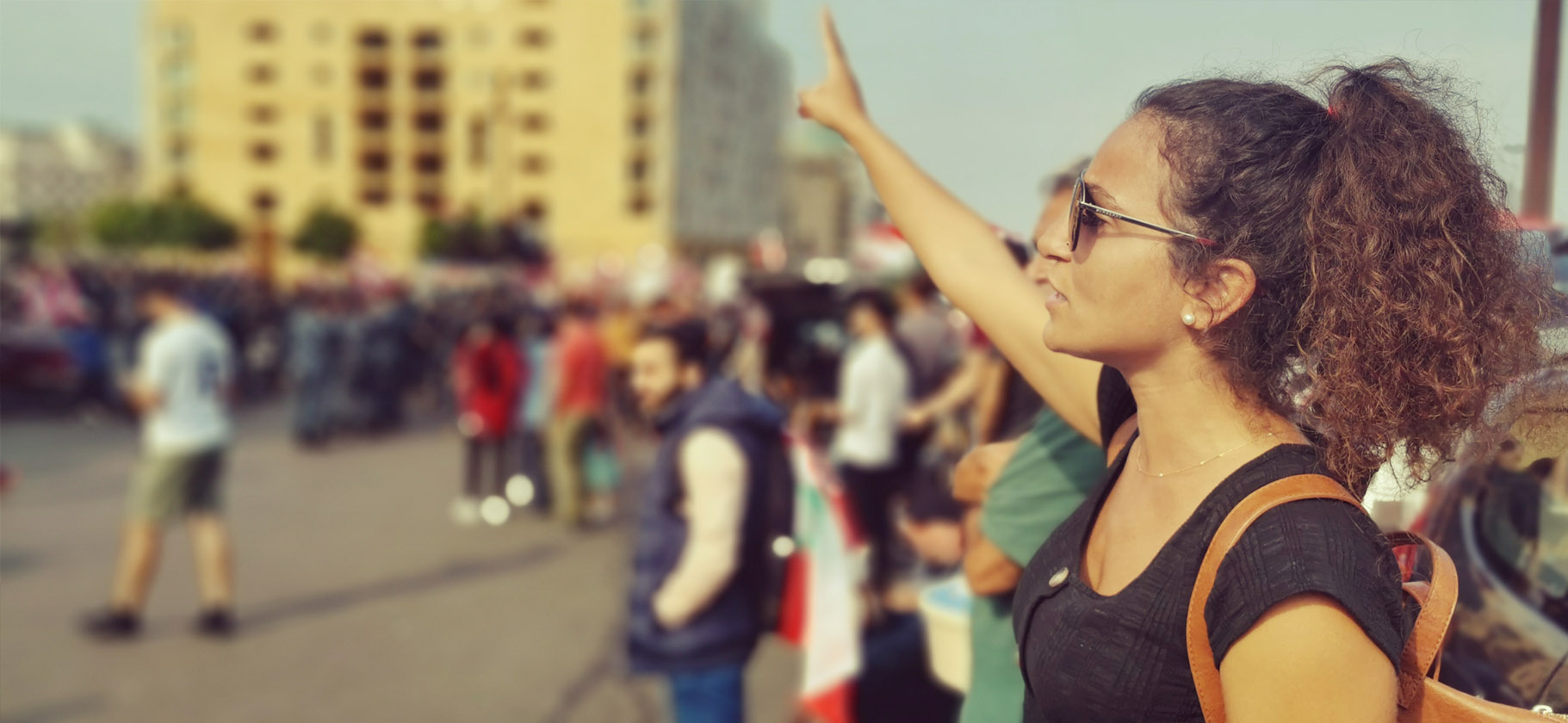
Within a few days, several cabinet members succumbed to the demands of the people and tendered their resignation. But it only served as fuel to the protestors leading to chants of, “All of them means ALL of them!”
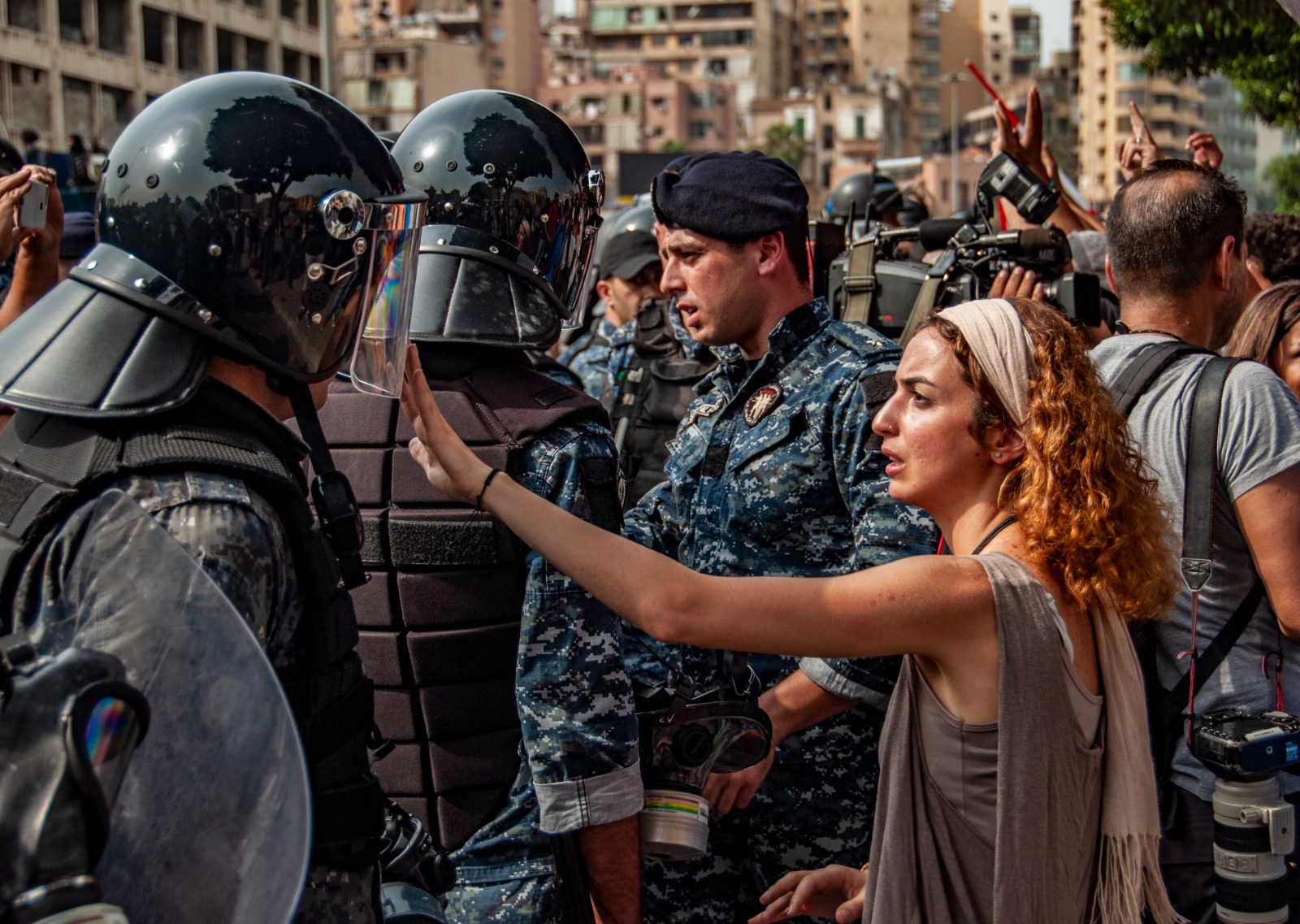 It is mid-morning and the underpass where Bechara El-Khoury runs from south to north into the highway leading through the city and all the way to the northern and southern edges of the country has been blocked off. Vigilant protestors have upturned dumpsters to block the roads cutting off the main motorways in and out of town. A few protestors maneuver a dumpster off to the side in order to let an ambulance pass through before blocking it off again and waving at the approaching cars to find another route. Other strategic points have been barricaded as well. Where there were no dumpsters to use, protestors have piled cinder blocks to stop the traffic. Where there were no cinder blocks they use their bodies.
It is mid-morning and the underpass where Bechara El-Khoury runs from south to north into the highway leading through the city and all the way to the northern and southern edges of the country has been blocked off. Vigilant protestors have upturned dumpsters to block the roads cutting off the main motorways in and out of town. A few protestors maneuver a dumpster off to the side in order to let an ambulance pass through before blocking it off again and waving at the approaching cars to find another route. Other strategic points have been barricaded as well. Where there were no dumpsters to use, protestors have piled cinder blocks to stop the traffic. Where there were no cinder blocks they use their bodies.
The Beirut Souks, the site of the old medieval markets, and the Downtown districts are deserted. Failing to retain any of the distinctive character of shopping bazaars throughout the Arabic world, it is an area that has been developed to be modernized and resemble the capitalist esthetic of the West. Shops are closed and businesses are at a standstill. “That’s actually the normal state of things,” Hiba tells me. “It’s not a real city. It’s all just luxury boutiques filled with things that nobody here can afford to buy.”
Heading west, the typically lively Hamra neighbourhood is also a shade of itself. Most of the restaurants and cafés are closed or serving only a handful of people. A group of men remove their shoes and huddle into a crowded room while prayer rings over the loudspeaker from the mosque. A boy in bare feet, a Syrian refugee, puts his hands together to get the attention of passersby as he begs for a few coins – his problems go beyond what is happening just a few blocks away. A group of men have gathered together some plastic lawn chairs and sit outside their kiosks as they watch the live feeds of the protests on the television, drink coffee, and smoke. An old man is sleeping inside his old spare parts shop, if somebody needs something, surely, they will wake him.
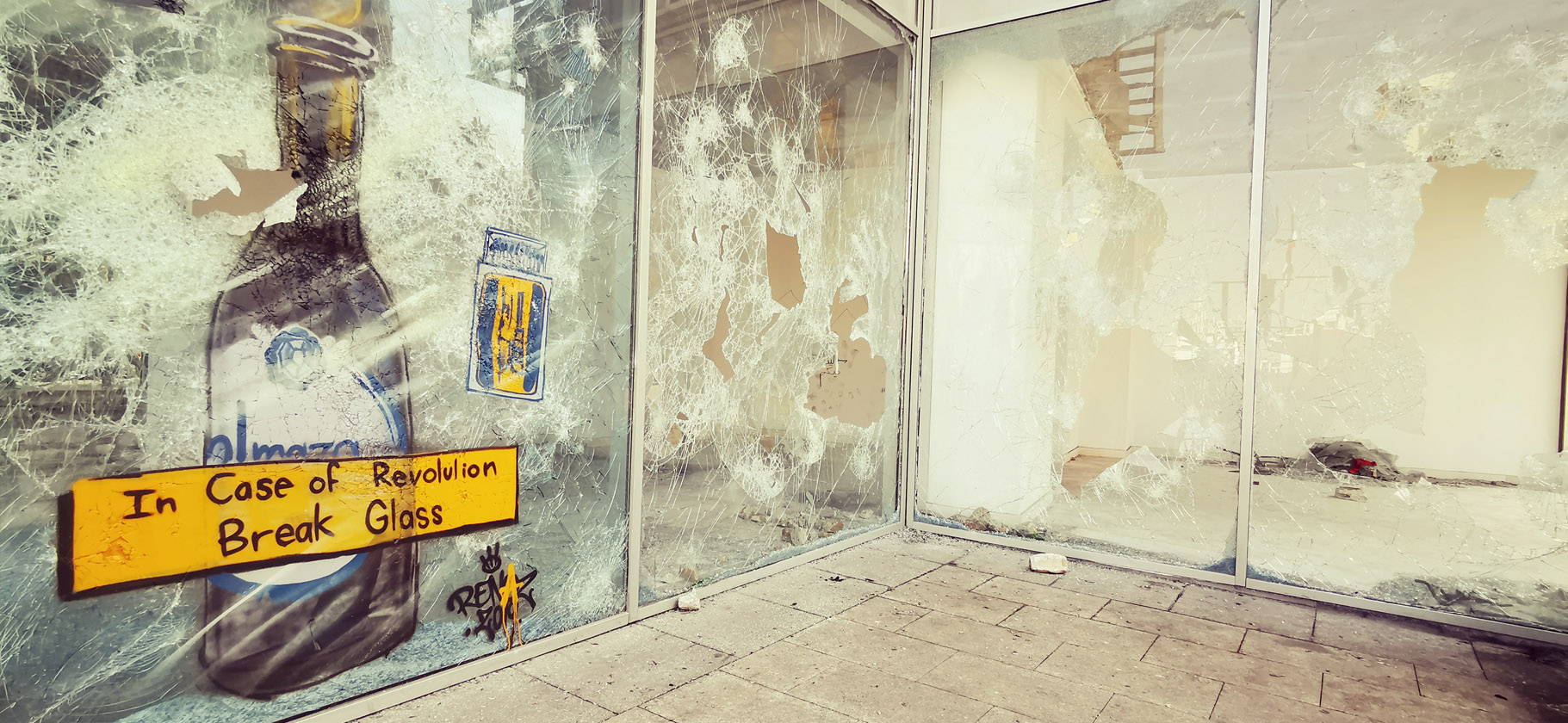 There is a constant presence of people gathered at Riad al-Solh and along the El Amir Bachir road that runs to the Mohammad Al-Amin Mosque and around the corner toward Martyr’s Square. A new economy has sprung up here as vendors have set up small booths selling everything from fresh pomegranate juice to protest t-shirts and Lebanese flags – everything you need to support the revolution. All of the pathways leading to Nijmeh Square have been cordoned off by the military. Between here and The Egg, a persistent reminder and symbol of the effects of the civil war, most of the first-floor windows have been smashed out. Bits of graffiti remind one to: “In case of revolution, break glass”.
There is a constant presence of people gathered at Riad al-Solh and along the El Amir Bachir road that runs to the Mohammad Al-Amin Mosque and around the corner toward Martyr’s Square. A new economy has sprung up here as vendors have set up small booths selling everything from fresh pomegranate juice to protest t-shirts and Lebanese flags – everything you need to support the revolution. All of the pathways leading to Nijmeh Square have been cordoned off by the military. Between here and The Egg, a persistent reminder and symbol of the effects of the civil war, most of the first-floor windows have been smashed out. Bits of graffiti remind one to: “In case of revolution, break glass”.
A large crowd has gathered in front of the mosque as the national anthem plays over speakers from a nearby van. A handful of army personnel looks on. News trucks dot the perimeter as cameras take up strategic positions around the scene and sit at the ready. A small group of men have managed to maneuver their truck into the area as they stand on the roof waving flags. As the music dies down, the crowd picks up the slack and chants of “Revolution! Revolution!” begin to fill the air, rising and rising before climaxing into cheers and whistles.
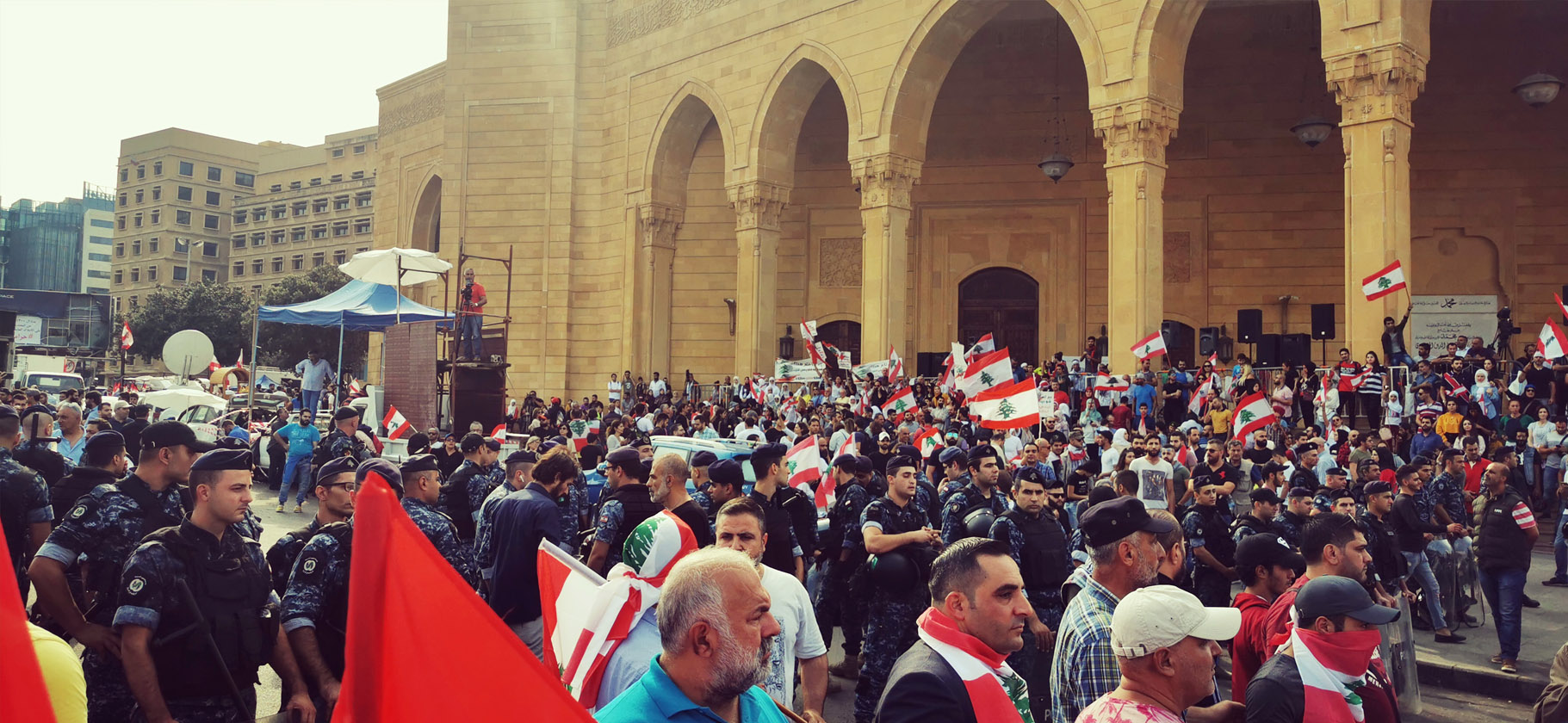
Suddenly army officers begin passing messages to each other over their mobile phones. They have been mobilized into action. In small groups, they begin heading toward the square by Riad al-Solh. Some of the protestors follow the soldiers to see what the commotion is, others head in the opposite direction eager to avoid violence. There is little room to maneuver in the tight square as a group of protestors, and their sense of righteousness, stand nose to nose with armed soldiers and their own sense of duty. The soldiers stand stoically as the protestors breathe insults into them. The crowd rocks and sways like the stalks of a wheat field in the wind. Both sides are determined to stand their ground, but neither are willing to turn the scene to violence. They know that one misstep and this delicate swaying could turn into a blood bath. But there is an understanding between them. The people love their army. The soldiers follow their orders, but they are of the people too.
Crossing George Haddad into Gemmayzeh and Mar Mikhael and the furor dies down. The cafés are open and offering water, toilets, and respite to the protestors. Yehia sits in his apartment in Hikmeh taking some time to relax. A group of friends have gathered in his Bohemian-style apartment flat to smoke and take a moment to sit back and stay cool. “It’s crazy,” Yehia says. “After the revolution, they took all of this money to invest in the country. Do you know how in debt we are? They stole it from us. It’s like this: they are in the government and they own the construction companies. It’s illegal to build by the sea, so what do they do? They change the law. Who will get the contracts now to build there? Their companies. How much will they say it will cost to build? Ten million dollars. How much will it actually cost? One million. What happens to the rest? Right into their pockets. But what about us? People die because they cannot afford health care. We cannot drink our water. We have to pay double for our electricity, once for the power and again for a generator when the power goes out. Our infrastructure and our roads are a joke. We have no public transportation. They built this mess. All of it. And the people can’t afford any of it. How can we be expected to pay first-world prices when we earn third-world wages?” His head sinks for a moment with exhaustion. “You know what, though?” he continues. “When I’m there, with the people, I feel invigorated. We are hopeful. It’s a special time. Things will change.”
In a nearby apartment, a handful of ex-pats and their local friends have gathered to eat and drink and take a leisurely dip in the rooftop pool after spending the morning preparing for the city marathon whose participation is now clouded in uncertainty. Their participation in the revolution is to bear witness. In acts of solidarity and good faith with the protestors they make appearances at the mosque and organize groups to clean up garbage and other debris. But they are immune to what is happening below. Whatever the outcome, the consequences will not touch them. They discuss what there is to see and do in other parts of the country and organize day trips in their minds and what they will do when the roads open again. They share anecdotes about the unique differences between the Lebanese and Europeans, and in so doing, paint with a broad brush.
Ágoston shares two revealing stories. The first about trying to hire a driver for his wife Zsófi who is in Beirut on assignment working for the UN:
“It’s a 7-dollar trip with Uber to get her to work,” he says. “So I ask a driver that I want to hire what price he will give me if I engage him to drive Zsófi every day. You would think because he is guaranteed to make a greater overall sum of money that he would offer a better rate per ride. Instead, he says it would cost 10 dollars per trip. When I object and explain that I am guaranteeing him a vast sum of money he complains that, although this is true, I am also burdening him with the stress of being relied upon every day for the job. And this is common here. The first consideration in business is always convenience, not profit.”
The second of Ágoston’s stories is about a wine tasting party he was planning to host: “I do this part-time work as a sommelier and I had been planning this event for months. Almost 50 people were invited and I could not get one person to offer to pay a deposit. Everyone said that they would go, that they were certain about it, but when the subject of a transaction required to make it possible came up, then they would be reluctant. And sure enough, just days before the event, this revolution happens and, of course, the tasting had to be cancelled. Since the civil war, it is like this. The Lebanese people know that anything can happen at any time so they live in the moment. Making faraway plans is not part of their mentality.”
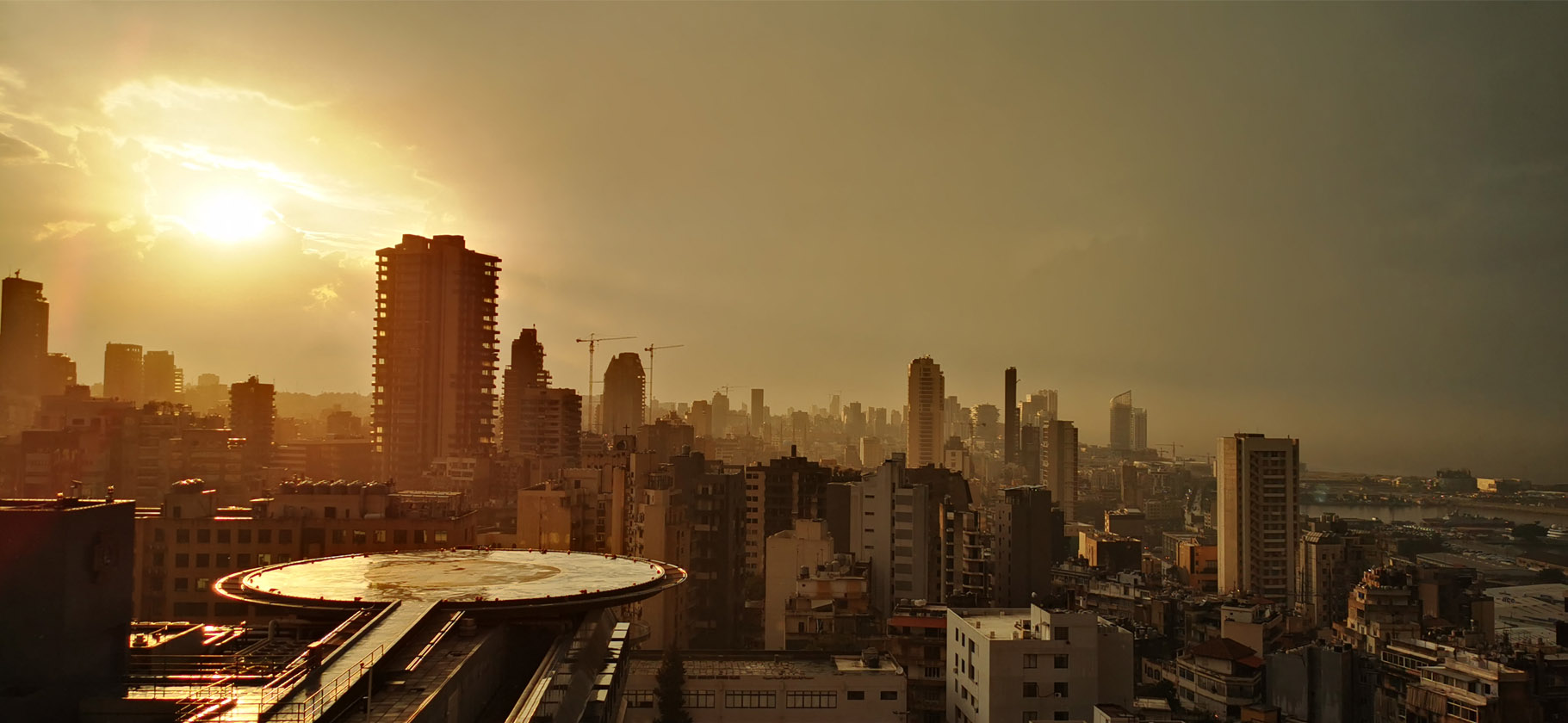
As the sun begins to descend below the Mediterranean, thunder roars overhead. Massive storm clouds roll in with haste and the sky opens pouring the first rains in five months down onto the protestors.
 By night, throngs of people have gathered along Alfred Naccash boulevard from Sassine Square to the Charles Malek intersection to sing and dance and fire off their anti-government chanting into the night. The skies have cleared and, with the workday over, the protestors by the Mohammad Al-Amin Mosque have trebled their numbers. Were it not for the presence of the military, the atmosphere would resemble more of a street party than a nationwide protest. Families have come to sing and dance by a stage that has been erected. A giant, defiant, cardboard fist is raised by one end of the stage as groups of friends hug each other and gather together to take selfies. It is a chance for them to capture a historic moment. News of the diaspora standing in solidarity in communities around the world has invigorated the people. The young believe that this is their time and they are bolstered with courage from the support of the generation who lived through the civil war and who admire what they now stand for.
By night, throngs of people have gathered along Alfred Naccash boulevard from Sassine Square to the Charles Malek intersection to sing and dance and fire off their anti-government chanting into the night. The skies have cleared and, with the workday over, the protestors by the Mohammad Al-Amin Mosque have trebled their numbers. Were it not for the presence of the military, the atmosphere would resemble more of a street party than a nationwide protest. Families have come to sing and dance by a stage that has been erected. A giant, defiant, cardboard fist is raised by one end of the stage as groups of friends hug each other and gather together to take selfies. It is a chance for them to capture a historic moment. News of the diaspora standing in solidarity in communities around the world has invigorated the people. The young believe that this is their time and they are bolstered with courage from the support of the generation who lived through the civil war and who admire what they now stand for.
Travelling south along Bechara El Khoury, past Sodeco, the traffic begins to pick up again and the chanting of the protestors begins to fade. Young boys ride in on their mopeds looking for late-night shawarma. A group of older men sit idly having a smoke and watching the news feeds on the television. Stray cats dodge traffic and pick at the strewn garbage from dumpsters that had been upturned earlier in the day. A young girl sits in a plastic chair, eyes transfixed on her phone, oblivious to the outside world. A small group of young boys, up well past their bedtime, play an impromptu match of football in the limited light dangling over a dusty parking lot next to a derelict apartment building. Prayer from a nearby mosque rings out over the loudspeaker. The erratic morse code of blaring car horns punctures the night air in the city on fire from revolution and bereft of tranquillity.